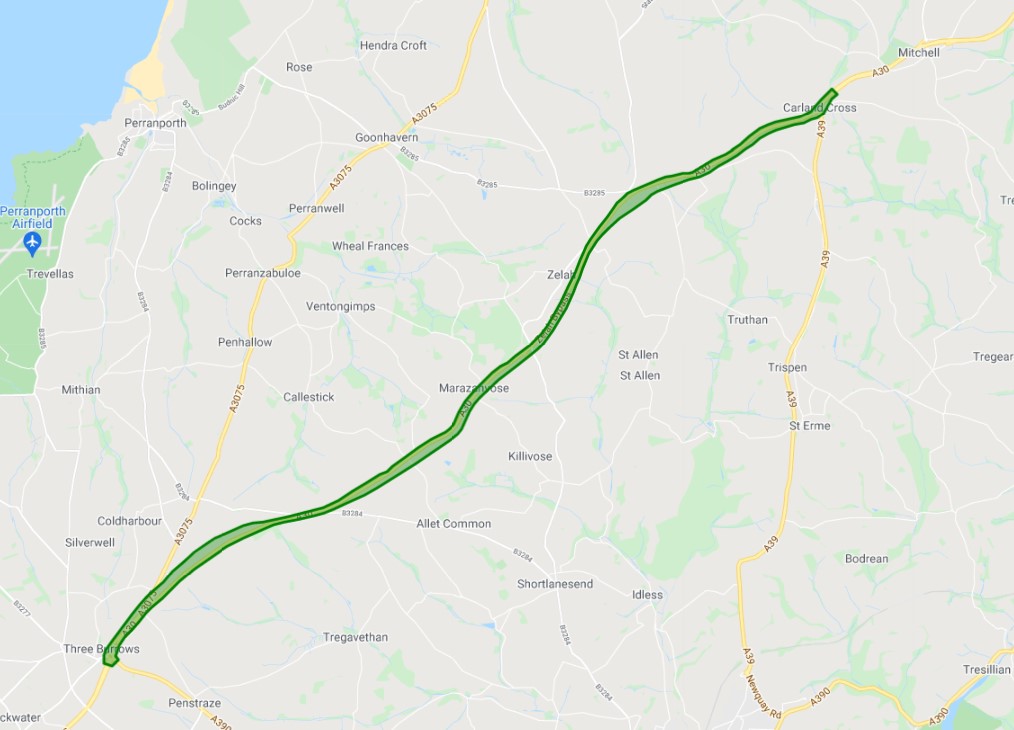A30 Chiverton to Carland Cross
Upgrading the A30 single carriageway between Chiverton Cross and Carland Cross roundabouts. As part of our Strategic Road Network, the A30 is a road of strategic importance, which is why an £8m contribution from the European Regional Development Fund has been committed, as well as being identified as part of the Government’s Roads Investment Strategy.
Funding for this scheme includes a contribution from the European Regional Development Fund of £8 million towards its development costs, with a further £12 million allocated for the construction phase.
Latest updates
-
24 February 2026
Resurfacing and finishing works update
We're finishing work on the A30 and some local roads.
Closures
Monday 23 February - A30 westbound between Mitchell and Chiverton Interchange
Closed overnight (8pm - 6am). These slip roads will also be closed:
- Carland Cross westbound exit and entry slips
- Chybucca westbound entry slip road
- Chiverton westbound exit slip
- Chiverton eastbound entry slip
Eastbound diversion by A3075 and A3076.
Westbound diversion by Goonhavern and Quintrell Downs
A30 westbound Mitchell to Chiverton closure and diversion route map
The A390 junction with Chiverton Interchange will be fully open towards Truro. However, temporary traffic lights will be in place.
Tuesday 24 and Wednesday 25 February - A30 eastbound between Scorrier and Mitchell and westbound between Mitchel and Chiverton
Closed overnight (8pm – 6am). These slip roads will also be closed:
- Chiverton Interchange eastbound exit slip
- Chybucca eastbound entry slip
- Chybucca westbound entry slip
- Carland Cross exit and entry slips in both directions
- Scorrier eastbound exit slip
Eastbound diversion by A3075 and A3076
Westbound diversion by Goonhavern and Quintrell Downs
Scorrier offslip diversion route map
Friday 27 February - Henver Lane from B3288 junction to eastern side of Henver Lane/Trevalso Lane junction
Closed overnight (8pm – 6am) for resurfacing
Henver Lane closure and diversion map.
We'll maintain access for residents at:
- Trevalso Farm
- Trevalso Cottage
- Henver Lane from the B3285 to Henver Cottage
Plan ahead and allow extra time for your journeys.
Please follow signed diversion routes rather than satnavs or using local cut throughs.
Please remember that closures can change at short notice. You can check the latest information on our daily closures page or find live travel information on our Traffic England site. Our travel alerts give details of live incidents on our network.
-
06 February 2026
Weeknight closures - A390, Henver Lane and Trevissome Park
We’re resurfacing some of the local roads around the A30.
We’ll be working on the A390, Trevissome Park and Henver Lane.
To allow our teams to work safely, there will be a mixture of overnight temporary traffic lights and some overnight local road closures in place.
Monday 16 February (7pm – 6am) - A390 junction with Chiverton Interchange.
The road will be closed overnight between Chiverton interchange and the southern end of Penstraze Lane.
Diversions
- Traffic will not be able to take the A390 from the Chiverton Cross interchange
- Traffic heading to Truro or the Royal Cornwall Hospital from the east should take the A39 at Carland Cross
Alternatively, you will need to:
- remain on the A30
- take the A3047, B3298, A393 and A39
- rejoin the A390 at the double roundabout junction at the top of Arch Hill and Morlaix Avenue
- From there, turn left onto Green Lane
The A30 will remain open throughout.
A390 junction with Chiverton Interchange closure and diversion route map
Access will be maintained for properties directly within the closure.
Tuesday 17 February (7pm – 6am) Trevissome Park access road
- Temporary two-way traffic lights will be in place overnight on the Trevissome Park access road.
The lights will be on the old A30 between Penstraze Lane and the eastern end of the entrance to Trevissome Park.
Wednesday 18 February (8pm – 6am) Henver Lane’s junction with the B3288 (formerly known as the A30)
- The road will be closed between Henver Lane’s junction with the B3288, and the eastern side of the junction between Henver Lane and Trevalso Lane.
Access to properties will be maintained in Henver Lane and Trevalso Farm.
Henver Lane’s junction with the B3288 closure and diversion route map
Please plan ahead and allow extra time for your journeys.
Please follow the signed diversion routes rather than sat navs or using local cut throughs.
-
13 January 2026
Underpass and green bridge update
We've opened local road connections at Trevalso and Pennycomequick.
We've also reopened the old A30 between Chybucca and Chiverton junctions in mid-December.
January closures - Pennycomequick and Trevalso underpasses
We’re installing lighting and carrying out other minor works at Pennycomequick and Trevalso underpasses.
We've closed both underpasses overnight (7am - 5am) Monday to Friday until:
- Pennycomequick underpass - Friday 16 January
- Trevalso underpass - Friday 30 January.
Diversion (both directions):
- take B3288 and the B3285 to Carland Cross
- head south onto the A39
- turn right into Ennis Lane
Follow the diversion in reverse order for the opposite direction.
Pennycomequick and Trevalso underpass diversion route.
Please plan ahead and allow extra time for your journeys.
The B3288 and the B3285 connecting to both underpasses are unaffected and remain fully open.
Green bridge planting
The dual-deck green bridge at Marazanvose is now taking on its green appearance following tree planting.
The bridge spans four lanes of the new dual carriageway and two lanes of the old A30, now the B3288.
The green bridge won't just provide better connectivity for wildlife but also farm access and a bridleway for horse riders.
We've planted two native hedgerows, with species including:
- Hazel
- Hawthorn
- Holly
- dog rose
- elder and wych elm
- hazel and hawthorn trees
- grasses and wildflowers
More seeding and planting will take place in the spring.
Once completed, the green bridge will provide safe passage across the road for various wildlife species, including:
- badgers
- voles
- other small animals, insects and birds.
Church Lane underpass now open
We've finished lighting work at the Church Lane underpass, which opened just before Christmas.
We've now installed CCTV technology along the A30 section.
Upcoming works
Next month, we'll do the cabling work for lighting in the Newlyn Downs underpass.
We'll continue landscaping work into the spring.
We'll update this page with our progress.
-
25 November 2025
A30 overnight closures - 25 and 26 November
We'll close the A30 in both directions overnight (8pm – 6am) from Chiverton Interchange to Carland Cross on:
- Tuesday 25 November
- Wednesday 26 November
Over the two nights, we'll also close:
- A30 Chiverton Interchange eastbound, including the eastbound on slip
- A30 Carland Cross westbound, including the westbound on slip
- A30 Chybucca Interchange westbound on slip.
We'll open the A30 as usual during the day.
Diversion
If you're travelling eastbound:
- take the A3075 to Goonhavern
- then take the B3285 to Carland Cross
If you're travelling westbound, follow the same direction in the opposite direction.
Please plan ahead and allow extra time for your journeys.
Please remember that closures can change at short notice. You can check the latest information on our daily closures page or find live travel information on our Traffic England site. Our travel alerts give details of live incidents on our network.
-
26 September 2025
Upcoming overnight closures - 29 September to Friday 10 October 2025
We’ll need to close the A30 to carry out final finishing works and remedial works.
Closures and diversions
Monday 29 September to Friday 3 October 2025
The A30 eastbound will be closed from Scorrier to Chiverton Interchange (including Chiverton Interchange eastbound exit slip road) between 8pm and 6am.
Traffic will be diverted:
- from Scorrier to Chiverton Interchange via Blackwater and the B3277 and vice versa
A30 eastbound will be closed from Scorrier to Chiverton Interchange diversion map
Monday 6 October to Wednesday 8 October 2025
The eastbound A30 Carland Cross exit slip road will be closed between 8pm and 6am.
Traffic will be diverted:
- from Carland Cross to Mitchell and returning westbound to Carland Cross
Eastbound A30 Carland Cross exit slip road diversion map
Thursday 9 October and Friday 10 October 2025
The westbound A30 between Mitchell and Carland Cross will be closed between 8pm and 6am.
Westbound A30 between Mitchell and Carland Cross diversion map
Please plan ahead and allow extra time for your journeys, during these works.
Please remember that closures can change at short notice. You can check the latest information on our daily closures page or find live travel information on our Traffic England. Our travel alerts give details of live incidents on our network.
-
08 September 2025
Upcoming overnight weekend road closures
We're closing the B3277 to carry out final finishing works and remedial works.
The road will be closed 24/7 between Chiverton Interchange and Rowes roundabout from 8am on Monday 8 September until 6am on Saturday 13 September 2025.
A clearly signed diversion route will be in place by
- Chiverton Interchange to Scorrier
- and through Blackwater to St Agnes and vice-versa.
The A30 (including all eastbound and westbound slip roads), the A390 and A3075 through Chiverton Interchange Roundabout will remain open.
Please plan ahead and allow extra time for your journeys, during these works.
Please remember that closures can change at short notice. You can check the latest information on our daily closures page or find live travel information on our Traffic England. Our travel alerts give details of live incidents on our network.
-
19 June 2025
Upcoming overnight weekend road closures
We’ll be closing the A30 (eastbound) from Chiverton to Carland Cross for works on the Tolgroggan overbridge.
The A30 will be closed overnight for two weekends on:
- Saturday 21 June and Sunday 22 June. The road will be closed both nights from 8pm - 6am.
- Saturday 28 June and Sunday 29 June. The road will be closed both nights from 8pm - 6am.
The road will be open as usual during the day.
Closures and diversions
The diversion route for through traffic will be well signposted.
All eastbound only through traffic will be diverted:
- off the A30 at Chiverton Cross
- onto the A3075 to Goonhavern
- following the B3285 to Boxheater
- continuing on the B3285 to Carland Cross
- rejoining the A30 Eastbound via the Carland Cross onslip.
What else will be open or closed?
- The B3284 (north and south) will still be open for travel between Pendown Cross and Shortlanesend, and vice versa via Chybucca overbridge. This includes the B3288.
- The Chybucca eastbound offslip will be closed. The Chybucca westbound onslip will be open.
- The Chiverton Cross A30 eastbound onslip will be closed.
- All other junctions - the A30 westbound offslip, B3277, A3075, A390 - will be open for connectivity, through Chiverton Interchange.
We apologise for any inconvenience these works may cause.
-
28 May 2025
Upcoming road closures – June and July
We’re working to complete the north and south roundabouts at Carland Cross junction.
We'll be resurfacing, installing permanent signage, surfacing the footpath and undertaking white lining works. We'll also be carrying out finishing works on the A30.
The overnight works will start on Monday 9 June and will last for four weeks. We’ll be working weeknights only (Monday – Friday from 8pm – 6am).
The works will be phased to minimise disruption.
Well signed diversions will be in place.
Upcoming weeknight closures
The following will be closed (weeknights only) for the four-week period:
- A30 Chiverton Interchange eastbound onslip and westbound offslip
- A30 access from Chybucca via the westbound onslip and the eastbound offslip
- Sections of the A30 will be closed over the four weeks. Please see phases below for closures each week
As well as the above, there will be:
Week 1 – weeknight closures
- A30 will be closed from Chiverton Interchange to Mitchell – both eastbound and westbound
- A39 will be closed between Cornwall Farm Machinery and Carland Cross
- B3285 closed between Carland Cross and Boxheater
Diversions and access
For the A39 to the A30, the diversion will be via B3275 Ladock Valley Road to Fraddon.
Access to the B3288 and for residents living in the closed ‘residents only’ section of the B3285, will be via Goonhavern and the B3285.
Access for the Shell Garage, Parklands Toyota and residents living in Wee dower Lane, will be via Mitchell Village and Wee Dower lane.
Please note - there will be no access to the A39 past the Shell Garage.
Week 2 – weeknight closures
- A30 Scorrier Junction to Carland Cross will be closed – both eastbound and westbound
- A30 Chiverton Interchange on and off slips both eastbound and westbound will be closed
Diversions and access
Access through Chiverton Interchange (north to south) will be open via the B3277, the A3075 and the A390.
A30 Scorrier junction to Carland Cross diversion route
Week 3 and 4 – weeknight closures
A30 Chiverton Interchange to Carland Cross will be closed – both eastbound and westbound.
Chiverton Interchange eastbound onslip and westbound offslip will be closed.
Diversions and access
Access through Chiverton Interchange (north to south) will be open via the B3277, the A3075 and the A390 including HGV’s.
The A30 diversion (eastbound and westbound) will be via the A3075 to Goonhavern then the B3285 to Boxheater and Carland Cross.
A30 Chiverton Interchange to Carland Cross diversion route
The following will remain open during the four week period:
- The B3284 (north and south) via Chybucca from Shortlanesend to Pendown Cross on the A3075
- The A390, A3075 and B3277 through Chiverton Interchange roundabout
Access will be maintained for those living within the closure area.
Passes will be issued for residents requiring access to the B3285 and Wee Dower Road. Please show passes to the team at the closure points.
Please plan ahead and allow extra time for your journeys, during these works.
-
07 May 2025
Overnight closures at Chiverton Junction - May 2025
We'll be implementing overnight closures on the Chiverton gyratory for final resurfacing and white lining work as well as other minor final works.
This will affect the B3277 from Rowes roundabout to the Chiverton interchange, the A3075 from Pendown Cross to the Chiverton interchange and the A390 from the Chiverton Interchange, which will be hard closed from just north of the entrance to Truro Lock and Leave. From there to Penstraze Cross and further towards Truro at the Threemilestone Roundabout it will be accessible to residents only.
There will be 3 nights of overnight closures, between the hours or 8pm and 6am, for the weekend of Friday 9 May, Saturday 10 May and Sunday 11 of May. This will include the slip roads.
Through traffic on the A30 dual carriageway will not be affected.
Diversion routes will be in place for access to and from Truro and all other locations.
Please plan ahead and allow extra time for your journeys during these works.
-
14 April 2025
Progress on reopening local roads around the A30
Since the opening of the new A30 dual carriageway in June 2024, we’re continuing our works to complete and reopen local roads.
We've completed and opened the old A30 – now known as the B3288.
The B3285 section from Boxheater to Carland Cross opened on 3 April.
We’re returning to the B3285 on 22 April to finish works between Boxheater and Carland Cross. There will be temporary two-way traffic lights in place for three weeks.
Please note, there will be no traffic management in place over the following dates:
- Rattler Fest: Friday 25 April into the weekend
- Early May Bank Holiday: Friday 2 May - Monday 5 May
Overnight closures at Chiverton Junction in April
Later this month, there will be weeknight closures of the Chiverton gyratory for resurfacing and painting of new road markings.
The Chiverton gyratory, including the slip roads, will be closed overnight (8pm – 6am) on:- Tuesday 22 April for three nights
- Monday 28 April for four nights
- Tuesday 6 May for four nights
During the day and at the weekends, Chiverton gyratory will be open. However, there will only be one lane open on the gyratory. Please allow extra time for your journeys.
The A30 dual carriageway will be open to through traffic as normal.
The closures will affect:
- the B3277 from Rowes Roundabout to Chiverton Interchange
- the A3075 from Pendown Cross to Chiverton Interchange
- the A390 from Chiverton Interchange - closed from just north of the entrance to Truro ‘Lock and Leave’
The following sections of road will have closures in place. Access will be for residents only:
- From Truro ‘Lock and Leave’ to Penstraze cross
- The A390 at Threemilestone Roundabout
Please note, there will be no closures or traffic management in place over the following dates:
- Rattler Fest: Friday 25 April into the weekend
- Early May Bank Holiday: Friday 2 May - Monday 5 May
Well-signed diversion routes will be in place.
Please plan ahead and allow extra time for your journeys during these works.
Closures can change at short notice. Dates may change due to poor weather conditions or operational reasons. If we’re unable to complete our work as planned, we may need to continue beyond the dates stated above.
Thank you for your continued patience and understanding while we complete the project.
-
07 March 2025
We’ve reopened part of the old A30 as the B3288
Last weekend we reopened the old A30 as the B3288 between Chybucca and Boxheater (near Zelah). This marks a significant step in completing the A30 Chiverton to Carland Cross project.
Going forward, drivers will be able to use the old Zelah bypass as a link between local roads and the A30 dual carriageway, reducing traffic levels in the village.
B3284 south closure will continue during March
The B3284 south of the new A30 is now closed and is scheduled to reopen on 24 March. Traffic is being diverted via Allet Lane to join the old A30 and then on to Chybucca. There will a temporary 30mph speed limit in place. Please observe this, the local diversion signage and allow additional time for your journeys.
Old A30 closure by Carland Cross Junction
From 03 March, we closed the section of the realigned old A30 between Carland Cross and Boxheater. The closure will be for up to 5 weeks in order to complete it and then reopen it as a new section of the B3285.
View the daytime temporary diversion route.
Work to finish Carland Cross Junction will also continue in March with overnight closures (8pm to 6am) of the roundabouts and slip roads. Overnight traffic can join/leave the A30 at Chiverton via Truro, or at Summercourt via the Ladock Valley.
Lane closures on the A30
Moving 24/7 lane closures are continuing on the A30 westbound in order to complete verge works, landscaping and other finishing work. These lane closures will finish in mid-March.
Please remember that closures can change at short notice. You can check the latest information on our daily closures page or find live travel information on our Traffic England website. Our travel alerts give details of live incidents on our network.
-
10 February 2025
Reopening local roads around the new A30
We will be completing and opening the old A30 as the B3288 between Chybucca and Boxheater (near Zelah) over the weekend of Saturday 1 March and Sunday 2 March.
Following this, we will then fully close the section of the realigned old A30 between Carland Cross and Boxheater on Monday 3 March for four weeks in order to complete it and then reopen it as a new section of the B3285.
Work to finish Carland Cross junction will continue this month with overnight temporary traffic lights in place from this week, followed by overnight closures of the junction in March.
Lane closures on the A30
Moving 24/7 lane closures are continuing on the A30 westbound in order to complete verge works, landscaping and other finishing work. These lane closures will continue until March.
Overnight closures of the A30 the week commencing 17 February
There will be overnight closures of the new A30 between Chiverton and Mitchell from Monday 17 to Friday 21 February. These closures will operate from 8pm to 6am.
This is for the final phase of verge work and telecommunications upgrades.
Please plan ahead and allow extra time for your journeys during these works.
B3284 closures
The overnight closures on the section of the B3284 north of the new A30 finish on Friday 21 February and work then moves to the B3284 south of the new A30, focused on the roundabout.
This southern section will close fully from Monday 24 February for up to four weeks, with local traffic diverted via Allet Lane.
Please remember that closures can change at short notice. You can check the latest information on our daily closures page or find live travel information on our Traffic England website. Our travel alerts give details of live incidents on our network.
-
14 January 2025
Overnight closures at Chiverton Junction in January 2025
We need overnight closures of Chiverton gyratory to finish work on verges, traffic islands, footpaths and supporting walls.
There will be nine nights of overnight closures,
We'll close the gyratory including slip roads overnight (8pm to 6am) on weeknights from:
- 14 to 17 January
- 20 to 24 January
Through traffic on the A30 dual carriageway won't be affected.
Diversion routes will be in place for access to and from Truro and other locations.
Please plan ahead and allow extra time for your journeys during these works.
Lane closures on A30
Moving 24/7 lane closures are continuing at different locations along the new A30 eastbound and then westbound until March 2025.
Progress reopening local roads around the A30
Since the new A30 dual carriageway opened in June 2024 we've been working to complete and reopen the old A30 (as the B3288 / B3285) and other local roads.
We expect to reopen the old A30 as the B3288 between Chybucca and Boxheater (near Zelah) in mid to late February 2025.
To do this, we'll extend the existing closure of the old A30 (B3288) to Boxheater from Monday 13 January for four weeks
This will allow us to join up the sections of road.
Diversion
During this time, we'll divert local traffic using the old A30 along Henver Lane to join the B3285.
We'll provide 24/7 access for residents inside the closure by a manned gate.
We expect to complete the rest of the local work Spring 2025.
Please remember that closures can change at short notice. You can check the latest information on our daily closures page or find live travel information on our Traffic England. Our travel alerts give details of live incidents on our network.
Thank you for your continued patience and understanding while we complete the project.
-
20 December 2024
December 2024 update
All traffic management will be removed from 20 December for the Christmas period.
Work will resume on 6 January 2025.
Thank you for your patience and understanding during 2024.
-
25 November 2024
Overnight closures at Chiverton Junction in December
From Monday 2 December at 9am, we will be implementing overnight closures of the Chiverton gyratory for 3 weeks (weeknights only until 20 December) for finishing work on the verges, traffic islands, footpaths and supporting walls.
This will include overnight closures of the slip roads and operate from 8pm until 6am, except on Wednesdays when closures will start at 10pm to allow for Truro late night shopping leading up to Christmas.
Through traffic on the dual carriageway will not be affected. Diversion routes will be in place for access to and from Truro and other locations.
There will be another 9 nights of these overnight closures of the Chiverton gyratory after Christmas, weeknights from 14-17 and 20-24 January.
Please plan ahead and allow extra time for your journeys during these works.
B3284 north reopening
Due to the weather conditions last week, the reopening of B3284 north of Chybucca has been delayed and is now expected to open early this week.
Lane closures on the A30
Moving 24/7 lane closures are continuing on the A30 eastbound in order to complete verge works, landscaping and other finishing work.
These lane closures will take place at different locations along the new A30, eastbound and westbound until March.Progress on reopening local roads around the A30
Since the new A30 dual carriageway opened in June we have been working on completing and reopening the old A30 (as the B3288 / B3285) and other local roads.
Unfortunately, along with the regular challenges of the weather there have been major issues with resource in our supply chain, and our programme has been delayed.
We are now expecting the old A30 to reopen as the B3288 between Chybucca and Boxheater (near Zelah) in mid-February 2025. We expect the rest of the local work to be complete by Spring 2025.
We apologise for these delays and thank you for your continued patience.
Traffic lights on local roads
From Monday 25 November there will be daytime temporary traffic lights on the Chybucca roundabout leading to the the B3284 south of the A30 for 3 weeks. They will be in place during off peak hours from 9:30am to 3:30pm everyday, except Sundays, until 13 December.
From Monday 2 December there will be overnight temporary traffic lights (8pm until 6am) on the link between the two Carland Cross roundabouts for 5 nights.
-
22 October 2024
UPDATE - Overnight closures around Carland Cross
We've made some changes to our overnight closures around Carland Cross this week.
Instead of full closures, there will be traffic lights in place so that residents can access the A39 via the B3285 (and vice versa) using the Carland Cross roundabouts. This allows for the Cornwall Highways work further south on the A39.
During these overnight closures:
- the eastbound slip road from the A39 to the A30 will be open
- the westbound slip road from the A30 to the A39 will be closed
The A30 dual carriageway will be open as normal during these closures.
Signed diversions will redirect traffic to other routes as appropriate.
Please allow extra time for your journeys and take extra care when driving at night.
UPDATE - Closure of the B3284 north from 28 October
From Monday 28 October at 9am, we will be closing part of the B3284 north link to Chybucca junction. This will be a 24/7 closure for four weeks. To clarify - the closure will not affect the eastbound slip road off the A30 at Chybucca or the route to Shortlanesend south of the A30.
Please plan ahead and allow extra time for your journeys during these works.
Other roadworks to note in the coming months
24/7 lane closures are now in place on the A30 eastbound in order to complete verge works, landscaping and other finishing work.
These lane closures will take place at different locations along the new A30, eastbound and westbound over the next few months.
There are also:
- overnight full closures of the A30 eastbound week commencing 4 November.
- Chiverton gyratory overnight closures in December
Please remember that closures can change at short notice. You can check the latest information on our daily closures page or find live travel information on our Traffic England website. Our travel alerts give details of live incidents on our network.
-
18 October 2024
Overnight closures around Carland Cross
As part of our finishing work on the A30 and local roads we'll be putting in more traffic controls during 2024. Some are in conjunction with Cornwall Council in order to make best use of the closures.
There will be overnight closures around Carland Cross, starting on Monday 21 October for four nights.
The southern roundabout, the underpass and part of the A39 will be closed for verge works. Closures will run from 8pm until 6am.
The A30 dual carriageway will be open as normal during these closures.
Signed diversions will redirect traffic to other routes. Please allow extra time for your journeys and take extra care when driving at night.
Come and meet the team
The A30 team will be at Truro Lemon Quay with our engagement van on:
- Monday 21 (2pm - 6pm)
- Tuesday 22 October (9am - 1pm)
Closure of the B3284 north from 28 October
From Monday 28 October at 9am, we will be closing part of the B3284 north link to Chybucca junction. This will be a 24/7 closure for four weeks.
This closure will be in place so that we can finalise road surface and drainage work. Traffic will be diverted to Chiverton Junction and the A3075 to access properties and businesses.
Traffic on the new A30 dual carriageway will not be affected by this closure.
Please plan ahead and allow extra time for your journeys during these works.
Other roadworks to note in the coming months:
- Chiverton gyratory lane restrictions will be starting in a few days.
- Ongoing A30 overnight lane closures.
- More overnight closures of the A30 eastbound w/c 4 November.
- Chiverton gyratory overnight closures in December.
Please remember that closures can change at short notice. You can check the latest information on our daily closures page or find live travel information on our Traffic England website. Our travel alerts give details of live incidents on our network.
-
10 October 2024
Roadworks at Chiverton junction
As part of our finishing work on the A30 and local roads, we'll be implementing some more traffic controls. This means we can continue our work to complete the project throughout the autumn.
From Monday 14 October at 9am, we will be implementing lane restrictions on and around the Chiverton gyratory for 6 to 8 weeks. These will operate from 9.30am to 3:30pm each day in two main phases.
These restrictions will be in place so that we can finalise work on the retaining walls around the junction, and allow the workforce to do this safely.
- the first phase will narrow the A390 approach to Chiverton to one lane
- the second phase will narrow the A3075 and B3277 approaches to one lane. There will also be reduced lanes available on the roundabout itself in order to manage traffic joining and leaving the A30, or accessing local roads.
Through traffic on the new A30 dual carriageway will not be affected by these restrictions.
Please plan ahead and allow extra time for your journeys during these works.
Overnight A30 closures
There will be overnight closures on the A30, eastbound only, starting on Monday 14 October for up to four nights. Closures will run from 8pm until 6am.
The signed diversion route will:
- take traffic off at Chiverton Junction and follow the A3075 to Goonhavern
- then take the B3285 to re-join the A30 at Carland Cross Junction.
Please allow extra time for your journeys and take extra care when driving at night.
Future closures and restrictions
Looking further ahead, there are several key closures planned as follows:
- Night-time closures of Carland Cross Junction and a joint closure of part of the A39 with Cornwall Council during the week commencing 21 October.
- A full closure of the B3284 north starting the week commencing 28 October.
Full details will be shared on this page in due course.
-
06 September 2024
Our work this autumn
Now that the school summer holidays are over, we'll continue our finishing work through the autumn.
Closures and traffic management
We'll need some closures and traffic control on local roads while we work.
B3277 link road from Chiverton junction to the services roundabout - 9 September to 23 September
We'll fully close the link road 24/7 from Monday 9 September 9am to Monday 23 September 6am.
Diversion
If you're heading from the A30 to St Agnes you'll be diverted:
- along the A30 to Scorrier junction
- then through Blackwater to re-join the B3277 at the Services roundabout
If you're travelling in the opposite direction, use the same diversion in reverse.
A3075 temporary traffic lights - Monday 9 September for up to six weeks
We’ll install temporary traffic lights on the A3075 near Chiverton junction
They will operate from 9.30am to 4pm each day.
The lights won't be in place during the Little Orchard cider and music festival.
Upcoming A30 overnight lane closures
We'll need further overnight lane closures on the new section of the A30 later this autumn.
These will be on the east and westbound carriageways in different locations. The closures won't limit the use of the new A30.
We’ll give you more further information on this page.
Please plan ahead and allow extra time for your journeys.
Memorial motorcycle run
The 37th annual Martin Jennings Memorial motorcycle run through Cornwall will take place on Sunday 15 September.
This is a large scale motorcycle event raising money for charity. Up to 2,000 riders are expected on a number of county roads.
The route includes a section of the new dual carriageway. Riders will join the A30 at Cornwall Services. Between 1pm and 3pm they’ll ride westbound before leaving the A30 at Camborne.
There are no traffic restrictions in place but this section of the A30 will be very busy. There are likely to be delays
Please plan ahead. Avoid this section of the A30 in the early afternoon, if you can. If possible, find an alternative route.
How can we find out more?
For more information, you can:
- email us at: a30chivertontocarlandcross@nationalhighways.co.uk
- call us on: 0300 123 5000
You can also follow us on X and Facebook for up-to-date scheme information and updates on roadworks across the region.
-
24 June 2024
We’re open for traffic!
This morning the first cars made their way along the newly opened A30 dual carriageway between Chiverton and Carland Cross.
We’d like to thank the people of Cornwall for their patience over the last few years while our teams have carried out this work.
While everyone gets used to this major route, we’d like to remind motorists to drive safely and familiarise themselves with the layout of the new junctions:
Chiverton junction
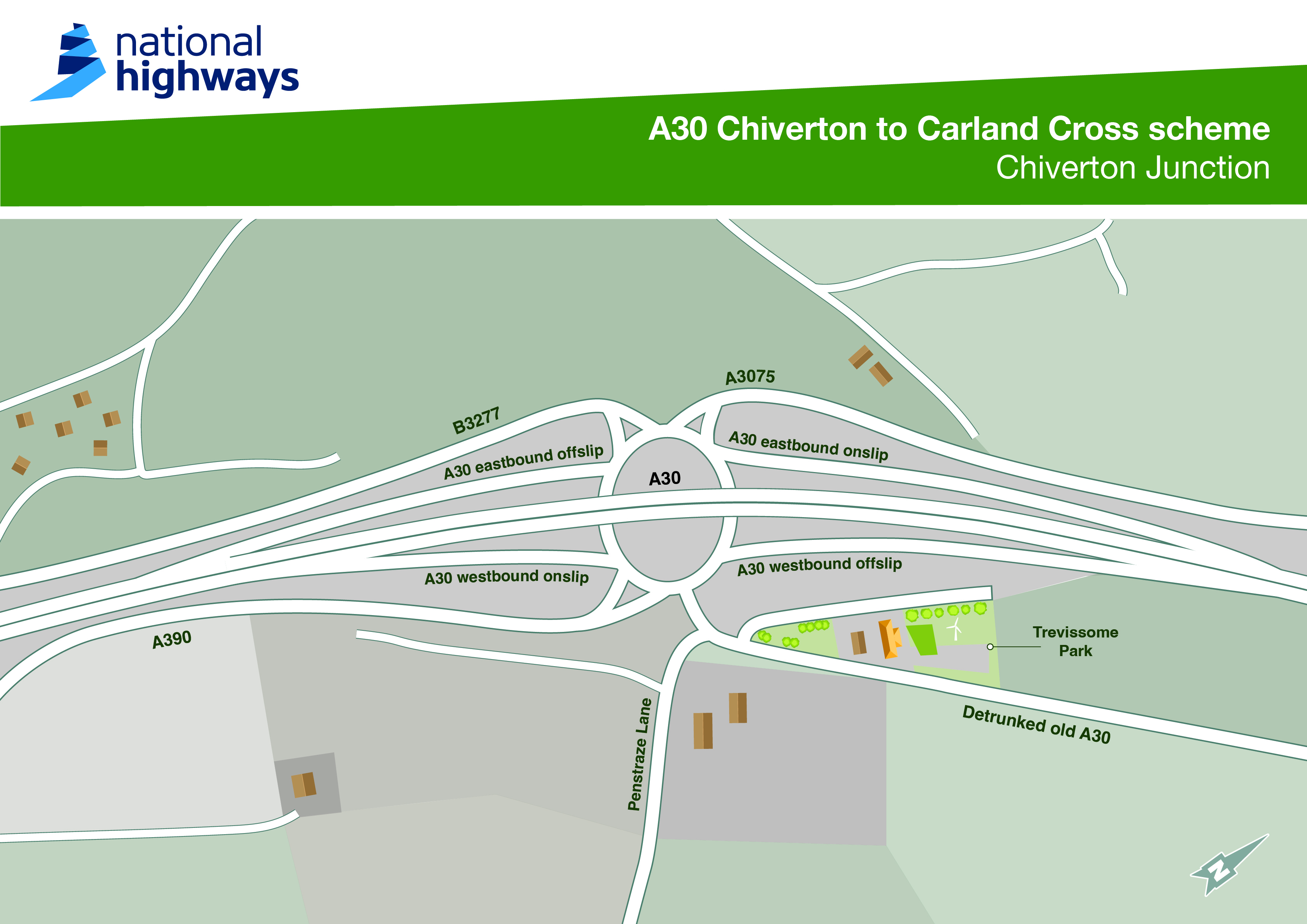
Chybucca junction
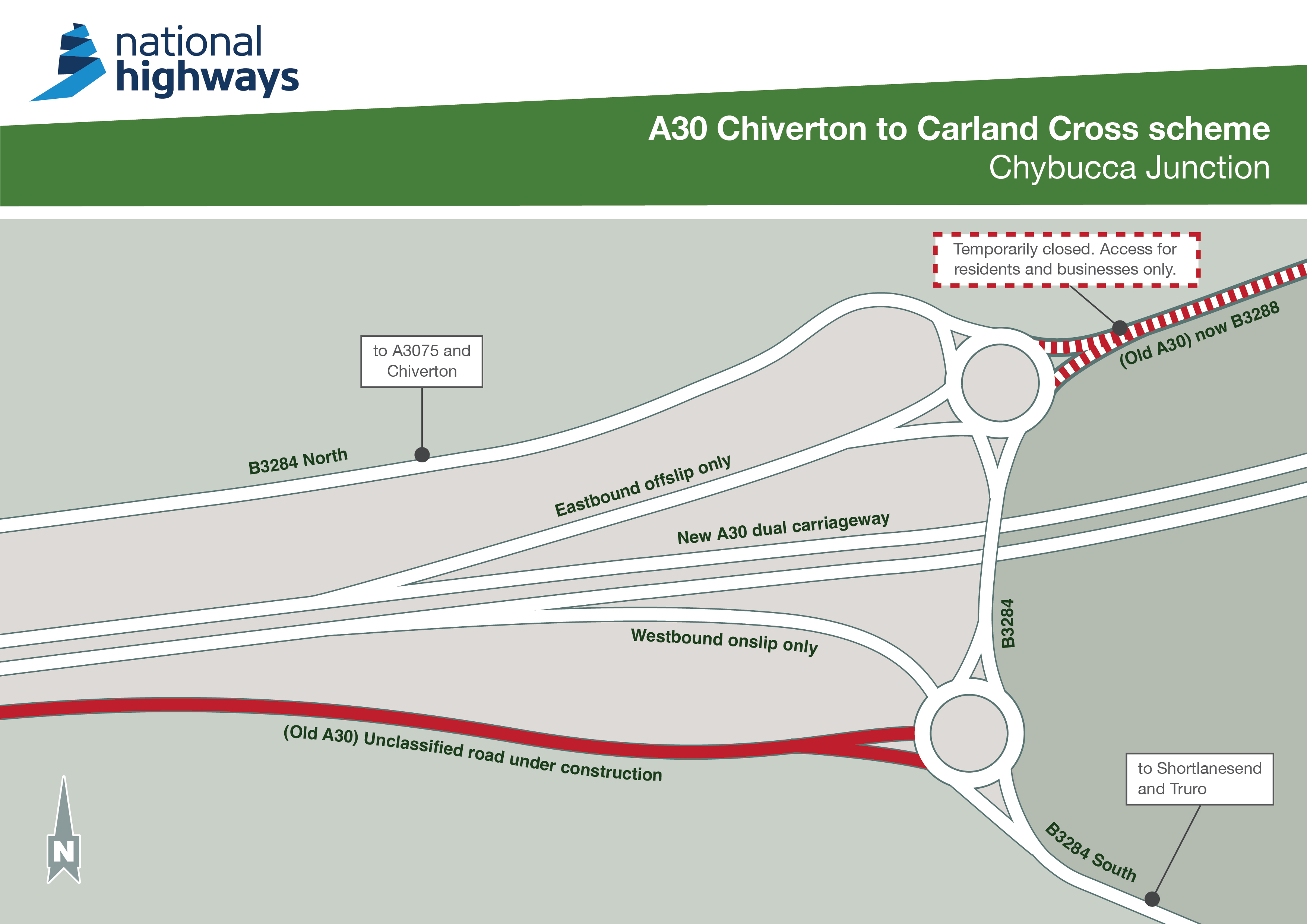
Carland Cross junction
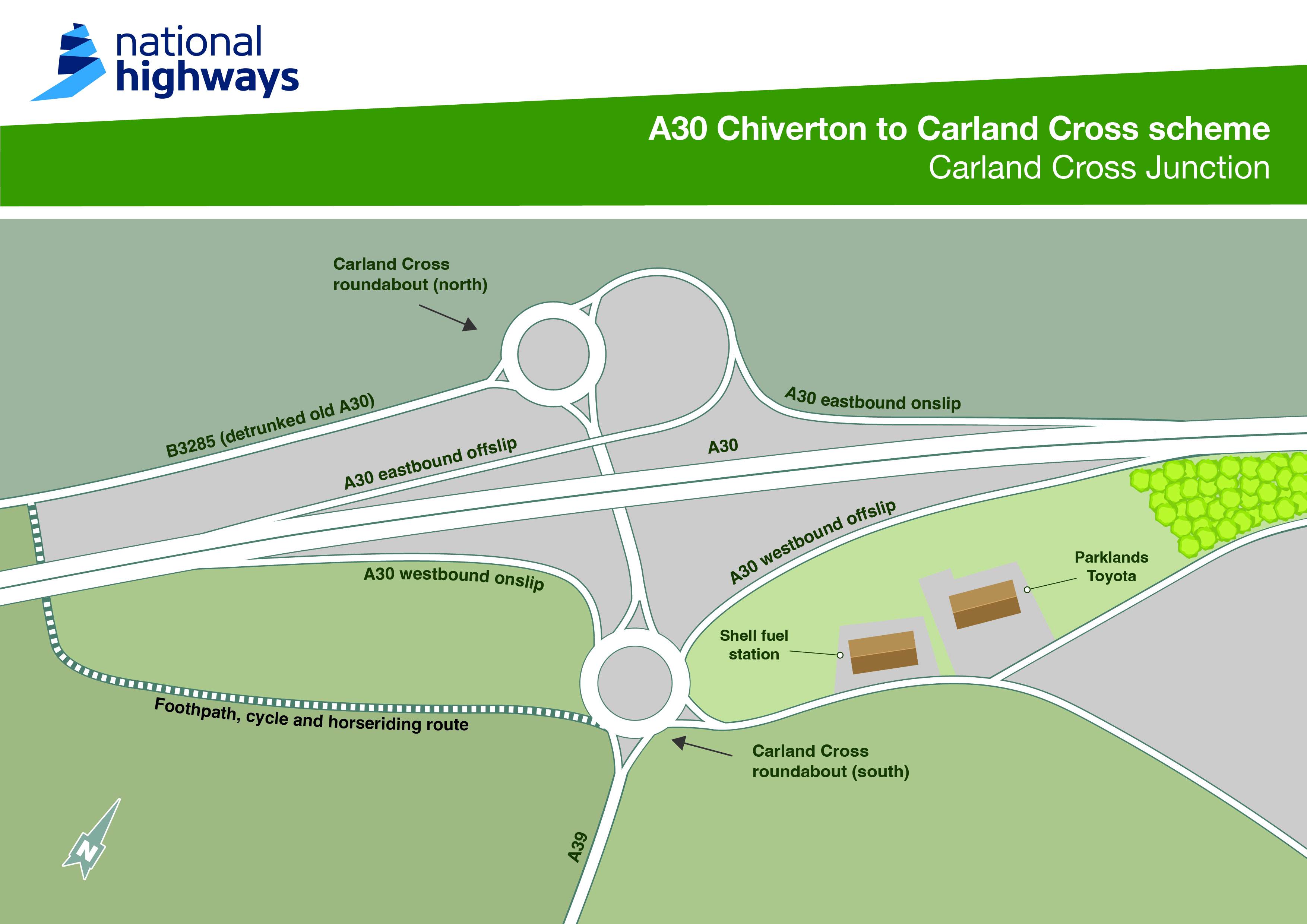
-
23 February 2024
New A30 dual carriageway enters final stages
We’re now in the final stages of our A30 Chiverton to Carland Cross upgrade project and will soon be preparing for the opening of the new dual carriageway later this year, before the school summer holidays.
Since the scheme received its Development Consent Order in February 2020, we’ve faced some significant challenges but despite these, we’ve made good progress.
The original Delivery Plan target date to open the new dual carriageway to traffic was the end of March 2024. However, since the start of construction, the programme of work has had to adapt to the effects of both the pandemic and growing weather challenges.
Between January 2021 and August 2023 there were 14 Met Office classified storms and since last August alone there have been an unprecedented total of 10 storms affecting Cornwall. As a result of the impact of the recent bad weather, we’re now expecting the road to be open for traffic in June.
The recent Chiverton flyover and Chybucca junction openings were significant milestones for the project and we’ll now be progressing with work on the new Carland Cross junction and ‘green bridge’ structure at Marazanvose.
-
19 December 2023
Chiverton flyover partially reopened
We are now in the final stage of the project – huge progress has been made in 2023 and we are now preparing for the opening of the new A30 in 2024.
Last week we partially opened the Chiverton flyover - a major milestone for the project. This has alleviated congestion as we now have one lane of east-west traffic in either direction bypassing the interchange without queuing. Local journeys north and south are also improved as drivers will no longer have to interact with the A30 mainline traffic.
-
31 May 2023
Chiverton Cross interchange to be installed
We've reached a major milestone on the project and will be installing the new Chiverton Cross interchange in June.
Following the installation traffic will use a new layout at Chiverton. The new layout will keep access open to the A390, A3075 and B3277 while we continue our work this year.
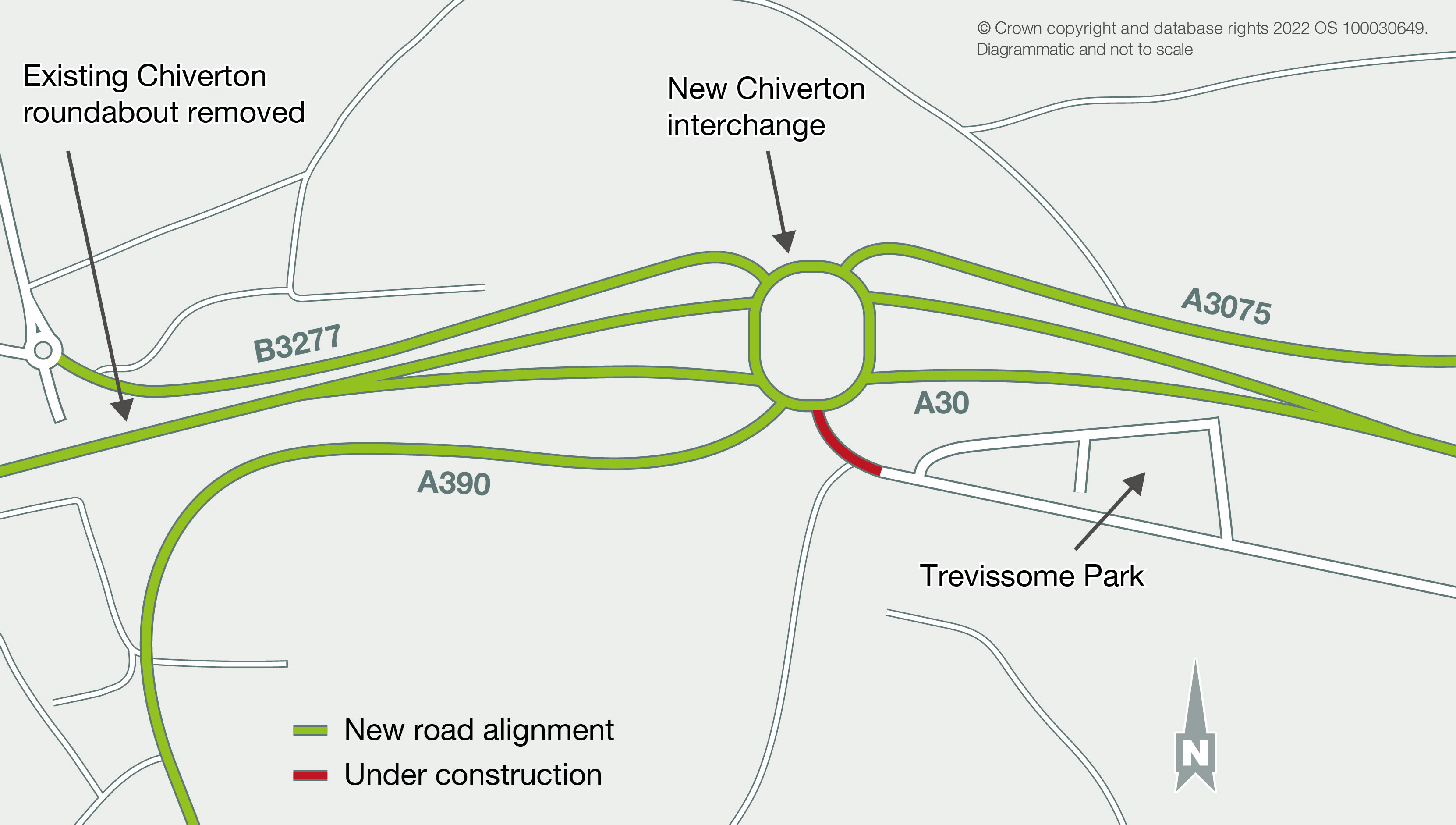
-
21 February 2023
Watch Tolgroggan bridge lift
We installed a new bridge over the A30 in double-quick time last weekend as part of our Chiverton to Carland Cross road dualling scheme in Cornwall.
The Tolgroggan access bridge has spanned the A30 near Zelah for 32 years and needed to be replaced to accommodate the new dual carriageway and the existing road between the Chiverton and Carland roundabouts.
Despite mist and mizzle, weather conditions and wind speeds remained suitable for the lifting operation and the new 137ft (42-metre) twin-beam overbridge was lifted into place by a 650-tonne crawler crane on Saturday afternoon.
Our Engineers then undertook tying-in work on the bridge, dismantling and transporting of the crane and extensive site and traffic management clearance. We managed to reopen the A30 to motorists at 2pm on Sunday – some 16 hours ahead of the anticipated opening on Monday morning.
The new bridge weighs 275 tonnes, the equivalent weight of 23 double decker buses or 887,097 standard Cornish pasties and will eventually span the existing A30 road and four lanes of the new carriageway.
You can see a timelapse footage of the weekend works in the video below.
Now in position, our work will concentrate on construction of the new road, with the existing bridge to be demolished later this year.
Neil Winter, National Highways Senior Project Manager for the A30 Chiverton to Carland Cross upgrade, said: “We thank people for their patience and co-operation while we carried out the work. The operation went as planned and although the weather wasn’t the greatest, conditions were favourable and the preparation work paid dividends.
“It’s a key milestone for the project, and now that we have the new bridge in place we will be able to switch our attention to the other structures along the route.
“As part of the scheme, we’re building 13 new structures in all, both under and over the new A30, with one existing underbridge at Two Burrows, a short distance from Tolgroggan, being refurbished.”
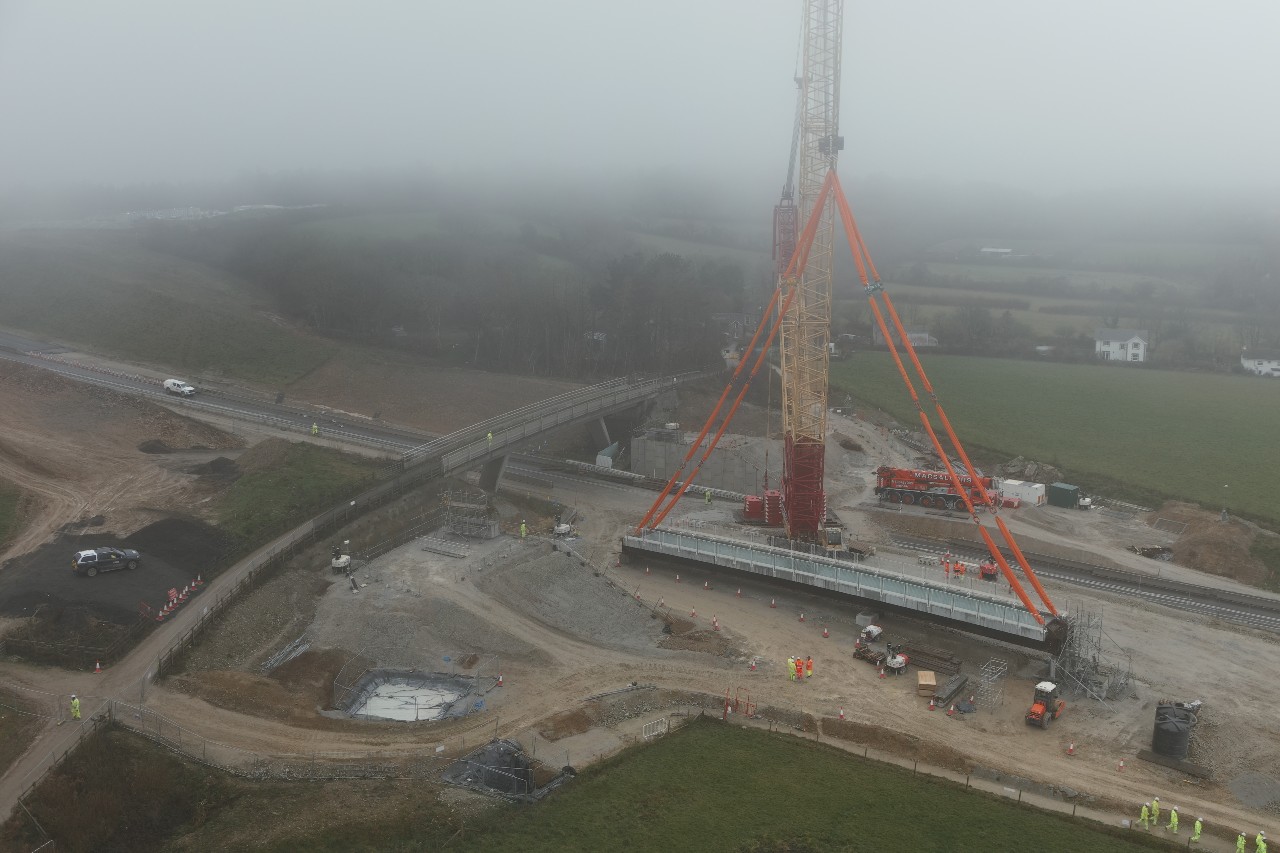
-
11 January 2023
Work continues on all structures
We’ve continued to work on all the structures, this included pouring concrete bridge decks at Chiverton, Chybucca, Tolgroggan and Carland. We’ve also installed bridge beams at Marazanvose allowing us to plan for the concrete deck pour and other work on this structure.
We’ve made good progress on our drainage work with the use of a specialist trenching machine in areas where there is hard rock.
We also completed our roadworks between Chybucca and Chiverton. This meant that we were able to realign the A30 through the Four Burrows and Chiverton junction area at the beginning of December.
Next steps
We’re getting ready to install a new bridge at Tolgroggan. This will replace the existing bridge which we will demolish later this year. We will need a weekend closure of the A30 to carry out this work safely, we’re just finalising our plans and will provide an update on the date for this shortly.

(Bridge beams being lifted into place last year for the new bridge at Tolgroggan)
Over the next few months we’re aiming to complete the:
- underbridges at Chiverton East and Carland Cross
- road surfacing in the Hill View area on the A30 westbound carriageway
- roadworks at Henver Lane.This will allow access to the northern part of the new Trevalso Lane underbridge to start over the next few months.
We will also be:
- changing the traffic management at Trevissome Park to allow access to the A390
- realigning the A30 at Zelah so that we can start work on the underbridge there.
-
10 August 2022
Cornish home produce is core to greener A30 road upgrade
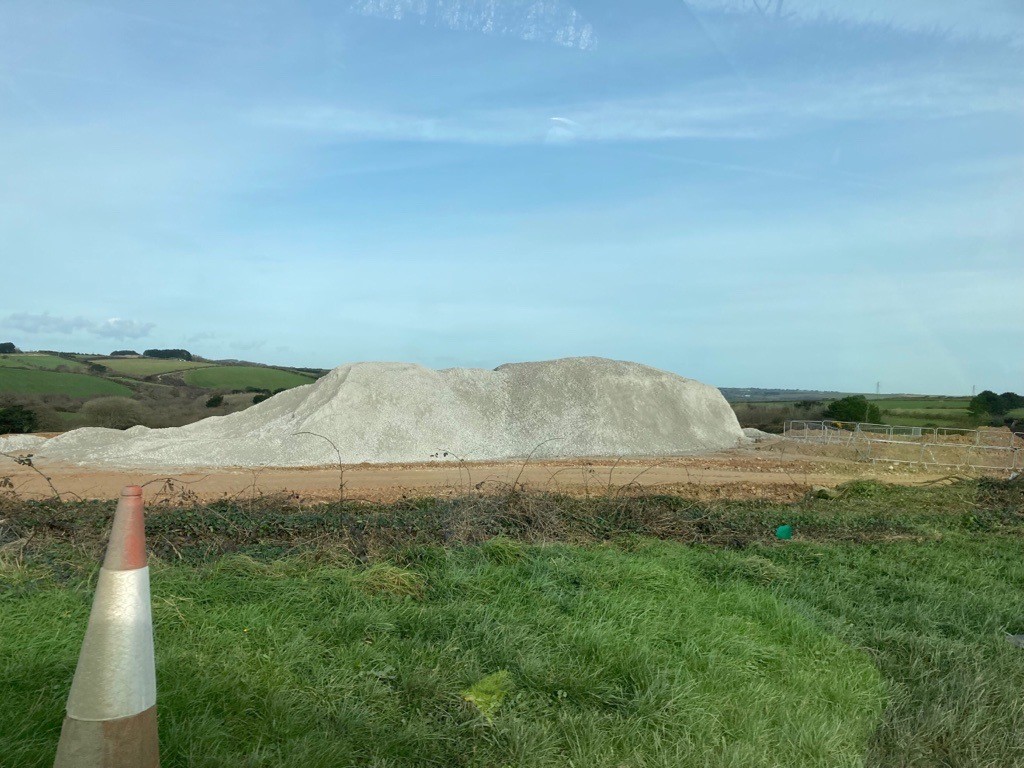
Cornwall’s very own china clay mining industry is playing a big part in the construction of our major A30 Chiverton to Carland Cross upgrade.
Sustainability and reducing the carbon footprint are key drivers behind construction of the 8.7-mile dualling scheme, and to that end contractors Costain Jacobs and supply chain Aggregate Industries are tapping into natural Cornish materials and a significant investment in local companies.
Larger infrastructure projects typically use millions of tonnes of aggregate – representing a large carbon footprint – but as with other modern-day road building schemes, the A30 project is utilising a by-product from the china clay mining industry.
The residue, known as stent, would normally have no use and be left in white spoil heaps, scarring the local landscape. Instead, the material from the Littlejohns Pit near St Austell is being processed into sustainable secondary sand and aggregate for construction use.
And just down the road, this is now being used as an engineering alternative across the A30 project, not only reducing the embodied carbon but also saving on the transport carbon cost.
Compared to the 5kg Carbon Dioxide equivalent (CO2e) per tonne carbon emission of virgin aggregate, the locally imported material is around 2kg CO2e per tonne, representing a reduction of around 3kg CO2e per tonne of aggregate used.
Added to that, Aggregate Industries has also invested over £4 million in the nearby Melbur Quarry at St Stephen to produce more carbon friendly warm mix asphalt for the new road surfacing.
Fully approved by National Highways, warm mix asphalt is a greener process that has less impact on the environment, with reduced hydrocarbon emissions and greenhouse gases. Due to its lower temperature, it is also safer for construction workers to use.
Warm mix asphalt is produced using temperatures up to 49 degrees Celsius lower than that used for traditional hot mix asphalt so less energy is needed in the heating process, meaning less fuel and a reduction in the plant's carbon footprint.
Roads Minister Baroness Vere said:
“The A30 Chiverton to Carland Cross upgrade will reduce congestion, improve journey times and provide much-needed connection for local businesses.
"By using natural Cornish materials, we are also ensuring the scheme has a much lower carbon impact and provides a further boost to the local community, which is exactly the kind of innovation we want to see as we strive towards a net zero road network.”
Nick Simmonds-Screech, National Highways Project Director for the A30 scheme, added:
“We’re already really proud of our environmental and ecological work – we’re forecasting a net biodiversity gain in the region of 20% – and this greener way of working also spreads to our construction methods and material supply.
"We all have a part to play in reducing our carbon footprint and adapting to climate change, and modern road building methods are certainly playing a part in this.
“The move towards warm mix asphalts allows us to not only achieve huge efficiency savings but also reduce carbon as we strive for net zero by 2040.
“Carbon reduction, along with ensuring our roads provide smooth, safe, and efficient journeys for motorists, are key and something we are constantly striving to improve for generations to come.”
As part of our Net Zero Plan, we're committed to reducing our maintenance and construction carbon emissions to net zero by 2040.
On the Cornwall upgrade, Costain Jacobs and its contractors are also tapping into local skills and supplies as construction on the £330 million scheme progresses.
Aside from the aggregate and asphalt production, this includes the:
- employment of site managers and engineers from the local area
- use of Devoran Metals for reinforcement on the project
- daily use of a local scaffold supplier
- use of smaller suppliers of timber products
- engagement with local colleges and the Camborne School of Mines.
John Lee, Costain Project Director, said:
“It’s been good to tap into local skills and materials, we’re making excellent progress with the construction works and on course for the new road to be open to traffic in winter 2023.
“We’re also committed to working with National Highways and its Net Zero Plan and the use of warm mix asphalts and china clay by-products is playing a big part in the A30 helping to reduce the carbon impact of construction.”
-
02 December 2021
Exciting archaeology finds on the A30
Since August 2020, the A30 team have been conducting archaeology investigations to record, report and preserve the archaeological findings along the A30 Chiverton to Carland Cross scheme.
The Archaeological Contractor, Cornwall Archaeological Unit (CAU), has discovered artefacts from the Mesolithic/Neolithic transition period (around 6,000 years ago), the Bronze age (around 4,500-3,000 years ago), the Medieval period (around 12-13th Century), and the World War Two period.
Throughout the summer of 2021, we have hosted volunteer events to assist with our archaeological investigations in targeted areas.
Targeted areas include Penny-Come-Quick and Ventonteague, where the finds include a clearly defined post ringfeature (pictured). We are still progressing with the excavation of the surrounding area to uncover the full archaeological background; however initial investigations show that this is likely to be the remains of a stone circle.
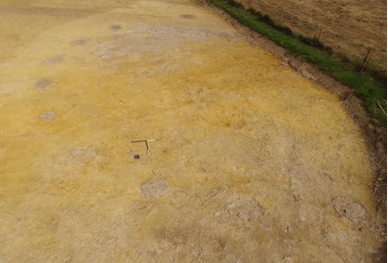
Aerial view of pit ring at Penny-Come-Quick. Source: Jamie Lewis, Costain
We are also conducting a flint scatter in an area known as Ventonteague. We have found over 6,500 flints in this area and are continuing investigations to locate the epicentre of the flint scatter activity. These flints suggest the use of Mesolithic hunting weapons, processing tools such as scrapers and axes, suggesting an that there was an extensive knapping area at Ventonteague.
The flint from these flint scatters is likely to have been transported from areas such as the neighbouring coastline in Devon or Somerset as flint does not naturally occur in this area of Cornwall. The knapping area at Ventonegue can therefore be indicative of a manufacturing area where a range of tools would have been produced for a variety of uses, such as for hunting game and butchering meat. Investigations have uncovered signs of a 6,000–8,000-year-old water culvert in this area, supporting the theory of repeated settlement and activity in the area.
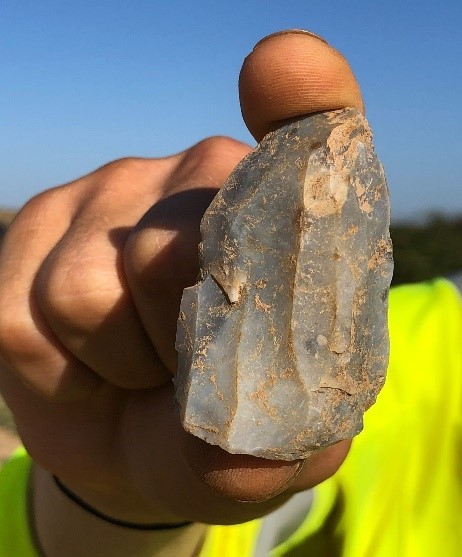
A flint found at Ventonteague, which is a core for striking blades off. Source: Cornwall Archaeological Unit.
Other excavations have uncovered two roundhouses in the Tolgroggan area which are likely from the Late Neolithic/Early Bronze Age and would have been used as a domestic dwelling. One roundhouse also featured a post ring (a central area of pits and post/stakeholes), flint tools and a pot located centrally in the ring centre.
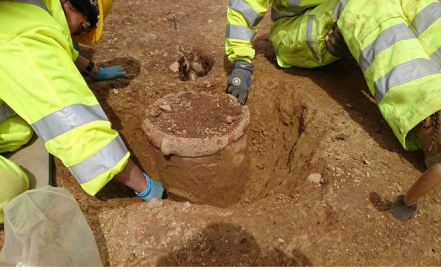
Archaeological team carefully excavating a prehistoric pot in Tolgroggan. Source: Cornwall Archaeological Unit.
The A30 team are continuing with these archaeological investigations with the support from Cornwall Archaeological Unit and the hard-working volunteers.
To keep in contact with the scheme, please contact A30ChivertonToCarlandCross@HighwaysEngland.co.uk or contact the Customer Contact Centre on 0300 123 5000.
-
16 April 2020
Development Consent Order granted
We were granted a Development Consent Order (DCO) on 6 February 2020 which allows us to build the design as submitted to the planning inspectorate (PINS).
We awarded a contract for the work to Costain on the 31 March 2020. In March, we also began preliminary works for the scheme. This includes the diversion of utilities, survey work to inform the detailed design and some site set-up work as we move through the summer.
Project information
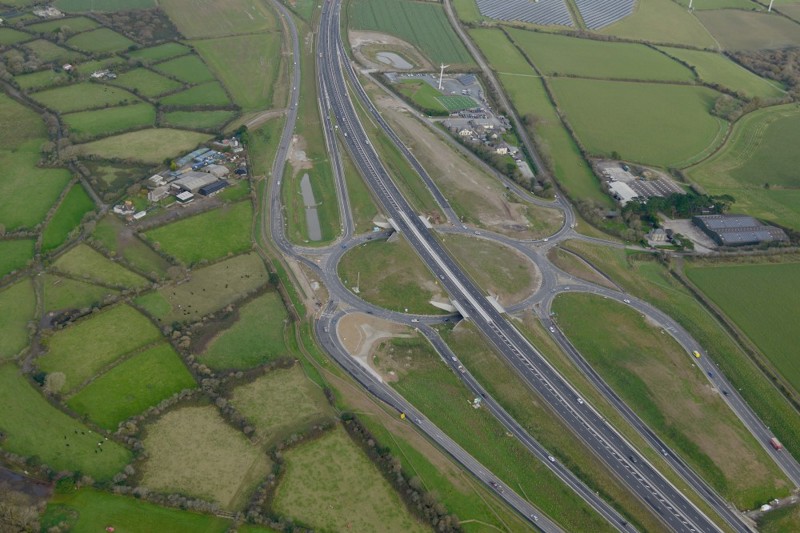
Chiverton
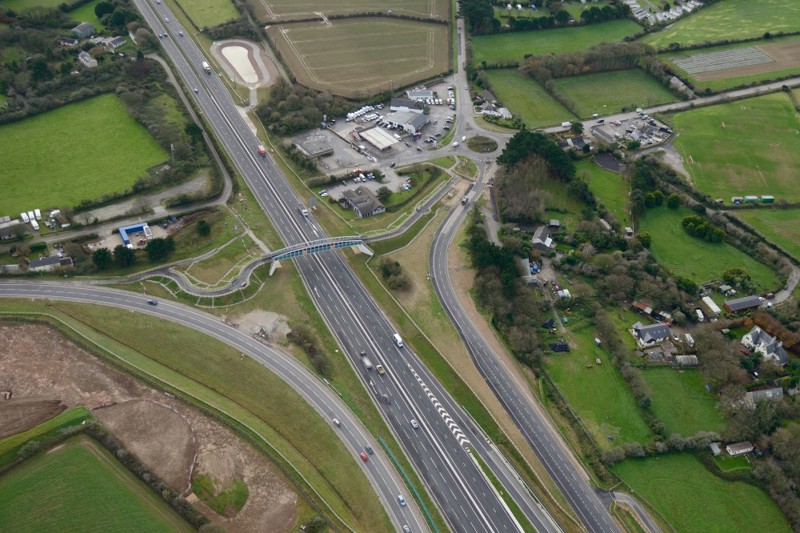
Chiverton bridge
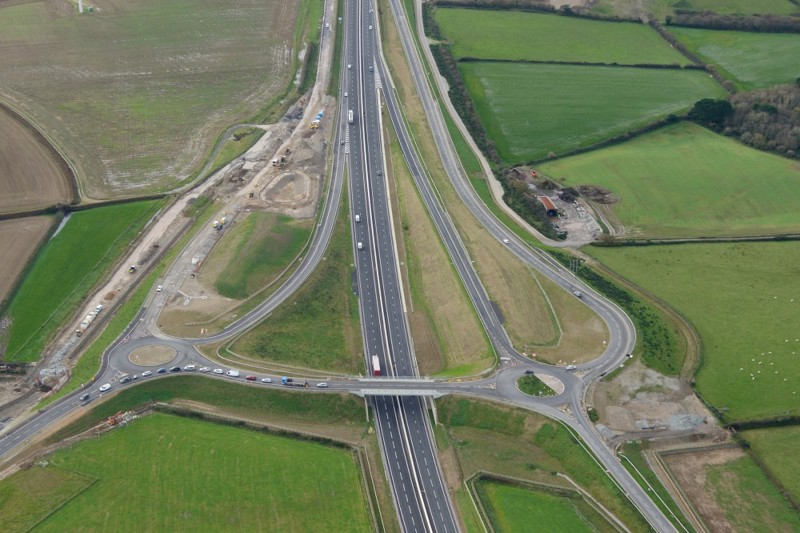
Chybucca
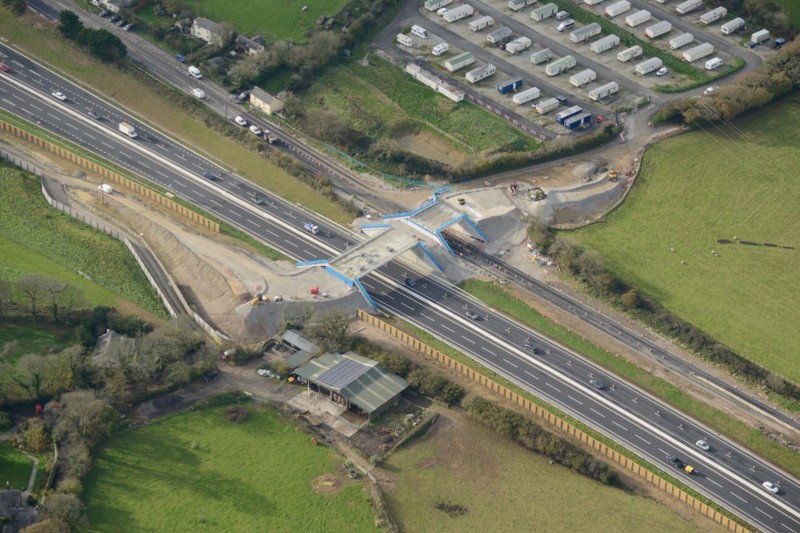
Marazanvose
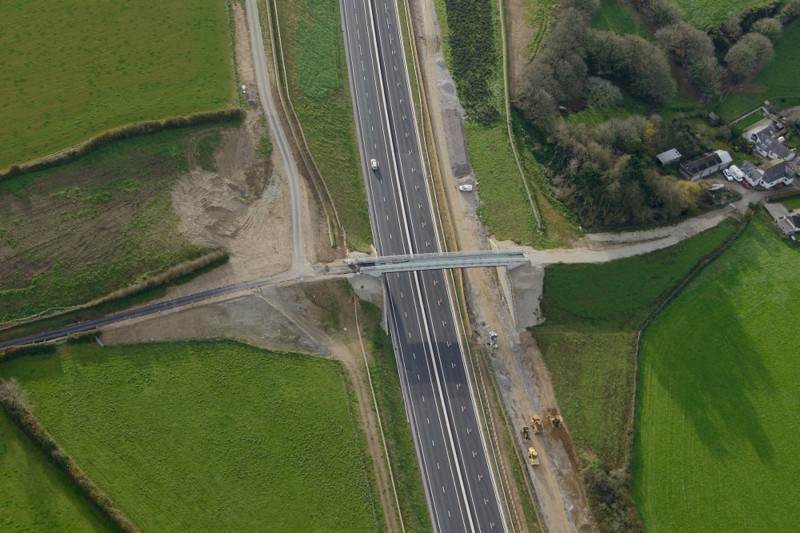
Tolgroggan Bridge
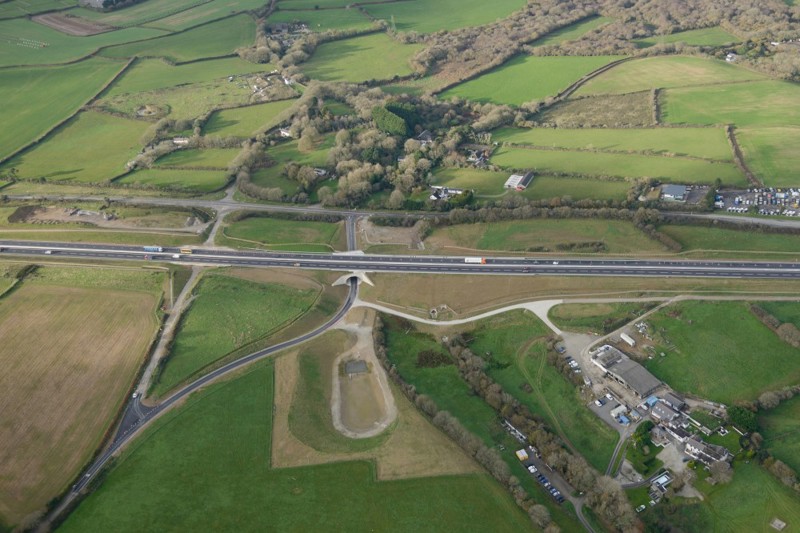
Tresawsen
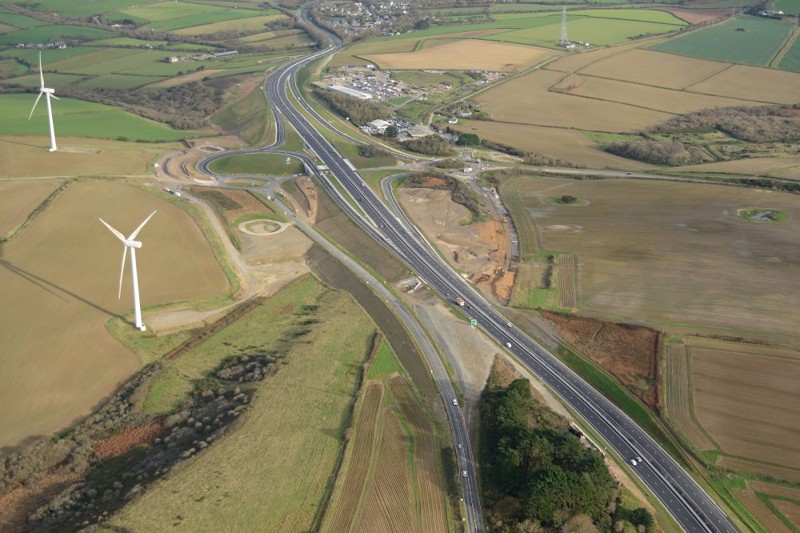
Carland Cross
Overview
The Government’s Road Investment Strategy included a commitment to improve the A30 between Chiverton Cross and Carland Cross roundabouts to dual carriageway standard. Funding for this scheme includes a contribution from the European Regional Development Fund of £8 million towards its development costs, with a further £12 million allocated for the construction phase.
What has happened so far?
On 6 February 2020, the Secretary of State for Transport gave the go ahead for the A30 Chiverton to Carland Cross scheme to be built by granting the Development Consent Order. We then awarded the contract to the Costain Jacobs partnership; and completed detailed construction planning as well as work involving environmental and archaeological surveys. We acquired the necessary permanent and temporary land parcels and set-up site.
In March 2020, construction works started. We worked round the issues created by Covid-19, breaking ground to build the road, construct the many underpasses and overbridges, attenuation ponds, Cornish hedge and other infrastructure.
We are constructing:
- 10 new underpasses and underbridges
- 3 new bridges over the new road
- Refurbishment of an existing structure
- Over 2.6 million cubic metres of earthworks
- 33 new culverts and wildlife crossings
- Nearly 29 miles of new highway drainage
- Over 12 miles of wildlife proof fencing
- New badger setts and bat roosts
- 8 miles of Cornish hedge
Benefits
Improving the A30 between Chiverton and Carland Cross is incredibly important for Cornwall’s future. It's the only remaining stretch of single carriageway on the A30 between Camborne and the M5 at Exeter; journeys on this part of the road are regularly delayed, congestion often brings traffic to a standstill, and as a result the Cornish economy is being held back.
For local people, particularly during the summer season, the simple act of getting to a neighbouring village can lead to unacceptably long and unreliable journeys, while opportunistic rat runners pose increased risk of accidents in their villages.
You can view our fast facts document to find out more.
The key objectives of the scheme are to:
- Make the route between Chiverton and Carland Cross more reliable by reducing congestion, journey times and providing more space for the travelling public
- Unlock growth, contributing to regeneration and sustainable economic growth by supporting employment and residential development opportunities
- Connect communities and making journeys easier by separating the strategic road from local traffic on the old A30. We will provide new bridges to cross the new A30 and maintain a route for local traffic and non-motorised users
- Design the proposed scheme to modern, safe and efficient road standards, which are suitable for the new dual carriageway
- Protect the environment, minimising impacts and where possible delivering enhancements to the environment
- Minimise disruption during the construction of the new road
Give us your feedback
Visit our A30 Chiverton to Carland Cross feedback tool to have your say. The tool includes an interactive map, so you can pinpoint any comments you may have about our work, or just give us general feedback.
ECHO is a one-way feedback tool, so if you'd like a response to your feedback, you can email the project team at A30ChivertontoCarlandCross@nationalhighways.co.uk
Documents
Project background
Public engagement report
Public engagement report: appendix A
Public engagement report: appendix B
Public engagement report: appendix C
Public engagement report: appendix D
Public engagement report: appendix E
Public engagement report: appendix F
Public engagement report: appendix G
Public engagement report: appendix G
Public engagement report: appendix G
Public engagement report: appendix H
Public engagement report: appendix I
Public engagement report: appendix I
Public engagement report: appendix I
Public engagement report: appendix I
Public engagement report: appendix I
Public engagement report: appendix I
Public engagement report: appendix J
Public engagement report: appendix K
Public engagement report: appendix L
Public engagement report: appendix M
Public engagement report: drawings
Public engagement report: drawings
Public engagement report: drawings
Public engagement report: drawings
DCO requirements documentation
The DCO process was established by the Planning Act 2008 and is used for certain large and complex schemes (including highway improvements) that have been designated as a Nationally Significant Infrastructure Project (NSIP) by the Government.
The benefits of the DCO process include extensive pre-application consultation, detailed analysis, including a full Environmental Impact Assessment, and examination by an independent inspector before the final decision is made.
The Secretary of State for Transport granted development consent for the A30 Chiverton to Carland Cross Development Consent Order (DCO) on 06 February 2020. Links to key DCO documentation can be found below:
- Examining Authority’s report and recommendations to the Secretary of State for Transport
- Secretary of State for Transport’s decision letter and statement of reasons
- DCO as made by the Secretary of State for Transport
The made DCO is Statutory Instrument 2020 No. 121 and is available to view at legislation.gov.uk.
Development Consent Order – Requirements Register
Requirements are conditions that have been included in the DCO, which control how the project must be implemented (constructed and maintained). Implementing the DCO in accordance with these conditions involves completing consultation and approval processes that have been defined in the DCO. These processes are referred to here and in the DCO as “discharging” the requirements.
This Requirements Register is a live document and will be updated as the process to discharge the requirements progresses.
The latest version will always be published below:
View the Requirements Register.
This register will be maintained for three years following completion of the project. The register sets out:
- each requirement
- whether the requirement needs approval by the Secretary of State (or other duty holder)
- whether any approval has been applied for or given
Related Road projects
Traffic information
Information about scheduled roadworks and events on our motorways and major roads.Sign up for updates!
Keep up to date with what's happening on this scheme by signing up to our updates.
